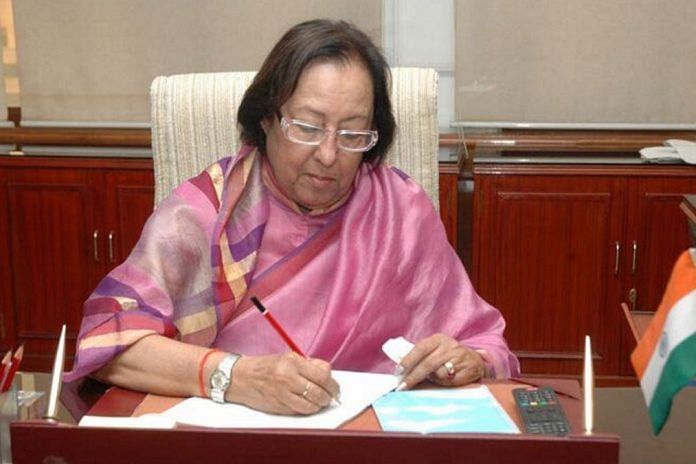Najma Heptulla has been a leading voice on Muslim women’s rights since her outspoken role in the 1986 Shah Bano case.
Now, as the governor of Manipur, she has come out strongly against triple talaq, which the Supreme Court abolished in a landmark decision Tuesday.
In an exclusive interview with ThePrint, Heptulla discussed triple talaq, as well as Islam’s interpretation of marriage.
Q. You have always spoken against this practice of Talaq-e-Biddat—three declarations of talaq in one sitting.
A. I am very happy that the Supreme Court judgment has now given a true interpretation to marriage in Islam. The judgement affirms marriage is a contract between two parties as described by 1400-year-old Quranic law. The court has now tasked the government with crafting legislation that can further support women’s rights in marriage.
Q. You were active during Shah Bano case too. Do you think the mistake made then has been correct by the Supreme Court now?
A. During the Shah Bano case I had the same opinion that I have now. What I said at that time was that life is not just about marriage and divorce.
As per Quaranic law, a woman should be allowed to inherit and own property and have fair compensation in the event of divorce. In 1937, under British rule, the Anglo-Muhammadan Law legalized triple talaq…But post-independence, when Pakistan was formed, it dissolved triple talaq and later Bangladesh did too. Only in India was triple talaq still allowed until today.
Q. The All India Muslim Personal Law Board has welcomed the SC judgment, but with some caveats.
A. During the Shah Bano debate, I had several meetings with AIMPLB and they tried to assure me that over the years they would bring reforms to correct it. Thirty years passed and they did nothing. Ultimately, suffering women would resort to the courtroom to protect their rights in a marriage.
As I said before, marriage in Islam is a contract where any condition can be introduced and agreed upon by the two parties and women have equal rights under the Quran. If the woman is unhappy or doesn’t like to be in the marriage, she has the option of taking a ‘Khula’—a process of dissolving the marriage at the woman’s request. But [this Quranic law] was distorted by the whims and fancies of some Muslim clerics who wanted to deny the rights of Muslim women.
Q. The Prime Minister has called it a historic judgment…
A. I am extremely happy and satisfied that Prime Minister Modi has praised today’s verdict. It will end the years of inequality faced by Muslim women and pave the way for their empowerment. This was much needed. The Supreme Court decision puts us at par with other Islamic countries in a good way.



